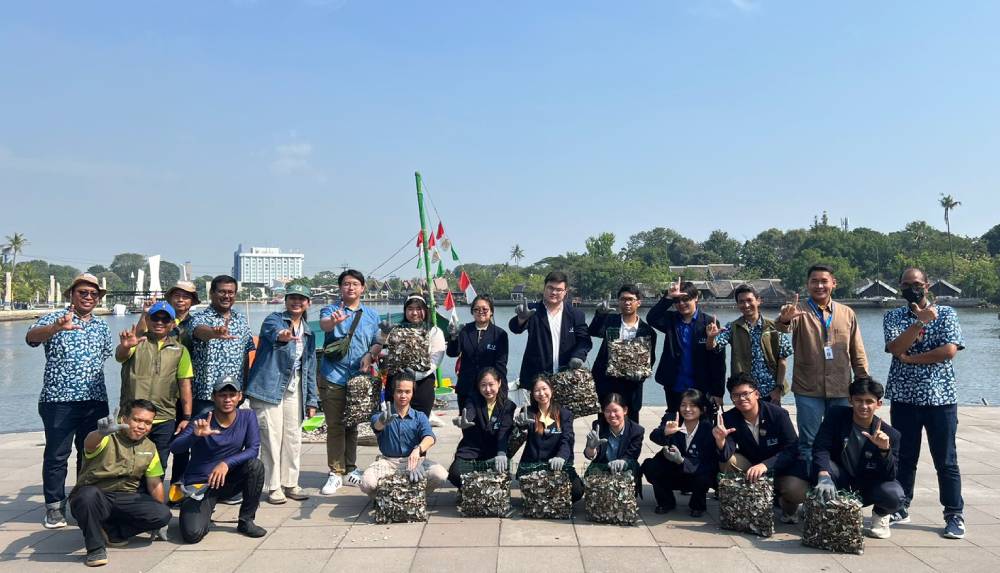
SGU Students Participate in Environmental Conservation at Ancol
Thursday, July 11, 2024 – In an era where climate change and environmental degradation are becoming increasingly urgent issues, sustainability is no longer just the responsibility of governments or large organizations. The younger generation plays a crucial role in creating a greener and more sustainable future.
Ancol Taman Impian witnessed the extraordinary enthusiasm of 12 Swiss German University (SGU) students, along with three prospective students, who joined in an environmental conservation initiative. With great enthusiasm, they participated in activities focusing on two main projects: Green Mussel Restoration and Ancol Zero Waste.
This event was a result of collaboration between SGU and PT Pembangunan Jaya Ancol, Tbk. The participants had the opportunity to learn about the importance of preserving the green mussel population and innovative ways to reduce waste in the Ancol area. During this visit, the students directly observed the impact of human activities on the marine ecosystem and the efforts made to mitigate it, giving them deep insights into the challenges and solutions in environmental conservation.
Green Mussel Restoration is a program aimed at restoring the green mussel population, which plays a crucial role in maintaining water quality and marine ecosystems. Green mussels can filter water and reduce pollution, thus helping to maintain ecosystem balance.
Meanwhile, Ancol Zero Waste is an initiative by Ancol Taman Impian to reduce waste by recycling, reducing plastic use, and managing waste more effectively. This program includes various strategies and activities designed to minimize the environmental impact of human activities in the Ancol area.
During the event, the students engaged in various educational activities. They participated in workshops, discussions, and practical sessions that showcased the restoration projects in action. Through this hands-on learning experience, their knowledge not only increased but also inspired them to think critically and apply sustainable practices in their daily lives. This activity also provided them with an opportunity to gain a deeper understanding of the science behind green mussel restoration and zero waste strategies.
The collaboration between SGU and Ancol Taman Impian reflects a strong commitment to promoting environmental responsibility. Both institutions strive to shape a generation of environmentally conscious individuals equipped with the knowledge and skills to make a positive impact. With this synergy, they hope to encourage more similar initiatives in the future.
This visit was not only successful but also left a profound impression on the students. They gained new knowledge and directly experienced the positive impact of their actions on the environment.
This real-world experience underscores the importance of experiential education and highlights the vital role of young people in shaping a sustainable future. With a renewed spirit and a deeper understanding of environmental conservation, SGU students return with open hearts and a strong resolve to be agents of change, ready to face future environmental challenges.
About Swiss German University
SWISS GERMAN UNIVERSITY (SGU) was established in 2000 as a joint effort between Indonesia, Germany, Switzerland, and Austria. We are the pioneer in offering international curricula in Indonesia. Qualified students can graduate with a Double Degree from Indonesia and Germany, which SGU provides in cooperation with partner universities; surely a valuable tool for your future careers. Ever since its establishment, SGU has been dedicated to delivering quality education in line with international standards and aims to develop skilled professionals who meet the demands of the industry. In order to achieve its objectives, SGU offers quality-oriented learning through 16 Bachelor‘s Degree Programs and 6 Master’s Degree Programs ranging from Engineering, Information Technology, and Business to Life Sciences and Social Sciences. Furthermore, with small class sizes, and with English as the medium of instruction, you can look forward to pursuing your tertiary education and degree with full confidence.

